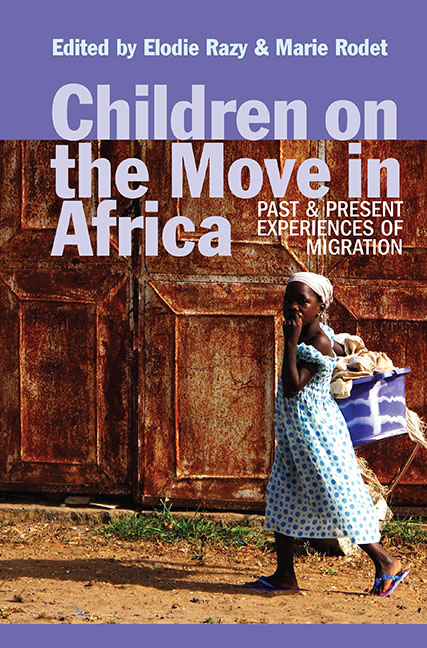Book contents
- Frontmatter
- Contents
- List of Illustrations
- Notes on Contributors
- Preface
- Acknowledgements
- Introduction: Child Migration in Africa: Key Issues & New Perspectives
- Part I CHILD MIGRANTS IN AFRICA: BEYOND THE DILEMMA OF VULNERABILITY v. AGENCY
- Part II BEING A CHILD & BECOMING A GENDERED ADULT: THE CHALLENGES OF MIGRATIONS IN CHILDHOOD
- Part III MOBILITY, IMAGINATION & MAKING NATIONS
- 6. Childhood, Space & Memory: Migrations of the Métis in Madagascar's Central Highlands (Nineteenth & Twentieth Centuries)
- 7. ‘We Were Mixed with All Types’: Educational Migration in the Northern Territories of Colonial Ghana
- 8. India–South Africa Mobilities in the First Half of the Twentieth Century: Minors, Immigration Encounters in Cape Town & Becoming South African
- 9. Education, Migration & Nationalism: Mapping the School Days of the First Generation of Southern Sudanese Nationalist Leaders, c. 1948–1972
- 10. Child Narration as a Device for Negotiating Space & Identity Formation in Recent Nigerian Migrant Fiction
- Bibliography
- Index
8. - India–South Africa Mobilities in the First Half of the Twentieth Century: Minors, Immigration Encounters in Cape Town & Becoming South African
from Part III - MOBILITY, IMAGINATION & MAKING NATIONS
Published online by Cambridge University Press: 25 October 2017
- Frontmatter
- Contents
- List of Illustrations
- Notes on Contributors
- Preface
- Acknowledgements
- Introduction: Child Migration in Africa: Key Issues & New Perspectives
- Part I CHILD MIGRANTS IN AFRICA: BEYOND THE DILEMMA OF VULNERABILITY v. AGENCY
- Part II BEING A CHILD & BECOMING A GENDERED ADULT: THE CHALLENGES OF MIGRATIONS IN CHILDHOOD
- Part III MOBILITY, IMAGINATION & MAKING NATIONS
- 6. Childhood, Space & Memory: Migrations of the Métis in Madagascar's Central Highlands (Nineteenth & Twentieth Centuries)
- 7. ‘We Were Mixed with All Types’: Educational Migration in the Northern Territories of Colonial Ghana
- 8. India–South Africa Mobilities in the First Half of the Twentieth Century: Minors, Immigration Encounters in Cape Town & Becoming South African
- 9. Education, Migration & Nationalism: Mapping the School Days of the First Generation of Southern Sudanese Nationalist Leaders, c. 1948–1972
- 10. Child Narration as a Device for Negotiating Space & Identity Formation in Recent Nigerian Migrant Fiction
- Bibliography
- Index
Summary
In 2012, a retired Professor of History who has done much to document the movement of indentured and free Indian immigrants from India to South Africa, completed a short memoir for his friends and family. In it, Surendra Bhana provides an account of the first eight years of his life in the small village of Sisodra (in contemporary Gujarat), before he set sail with his mother, father and young sister to South Africa in 1948. Bhana presents a carefree experience of village life, of encounters with cobras, playful games with mates, journeys to weddings by bullock carts and of being indulged as the only son in the family. He recalls walks to his mother's nearby village, Moldera, where there was an extensive family of uncles. A bullock-operated oil presser dominated the centre of the house for the uncles were door to door oil sellers. Bhana knew his father was in Johannesburg, South Africa running a tailoring business. He writes: ‘The folks around me talked a lot about South Africa. I don't remember much except that my father was there, and that one day he would come to take me to that country.’ His father eventually came to attend his elder daughter's wedding and to take his wife and two younger children to South Africa. ‘My father was determined to take me along. You had no future in India, he used to say to me.’ The boy was excited about this journey by ship from Bombay to Delagoa Bay (now Maputo, in Mozambique). From there, they crossed the Komatipoort border into South Africa and boarded the train to Pretoria. The subsequent narrative is devoted to his experiences of learning English and Afrikaans, going to school, finding friends among the Gujarati caste group to which the family belonged, part-time work collecting customers’ laundry for an uncle's business in Johannesburg, normal adolescent escapades, and the start of a career after completing a degree at the University of the Witwatersrand. We are also provided with a vivid sense of the roughness of life in the poorer districts of Johannesburg.
The literature on the Indian diaspora has tended to focus primarily on the movements of various classes of migrants (merchants and workers), their trade and work conditions, political and labour struggles to improve their condition in the new society, relations with the homeland and religious and cultural activities.
- Type
- Chapter
- Information
- Children on the Move in AfricaPast and Present Experiences of Migration, pp. 159 - 174Publisher: Boydell & BrewerPrint publication year: 2016



